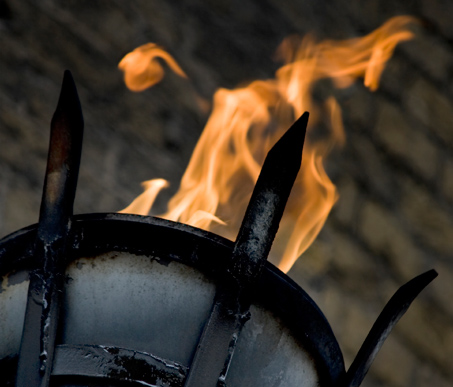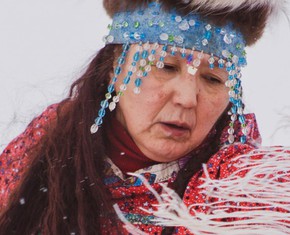The views expressed in our content reflect individual perspectives and do not represent the authoritative views of the Baha'i Faith.
In the Biblical story of Abraham’s eternal covenant, God asks him to butcher five animals, and Abraham complies. As the butchered animals lie there, ready for someone to walk between them and ratify the covenant, winged predators swoop down upon the carcasses.
Symbolism again, by any chance? Do these birds of prey signify spiritual enemies, ready to swoop down and disturb the functioning of this new covenant? Can the ferocious birds be compared to the pharaoh who pursued Moses, the crucifiers of Jesus, the enemies of Muhammad, and the persecutors of the Bab and Baha’u’llah?
Abraham drives the birds away, indicating that the covenant is safe. Shortly after that, night descends. Abraham falls asleep and has a nightmarish vision of the future:
As the sun was setting, Abraham fell into a deep sleep, and a thick and dreadful darkness came over him. Then the lord said to him:
Know for certain that your descendants will be strangers in a country not their own, and they will be enslaved and mistreated four hundred years. But I will punish the nation they serve as slaves, and afterward they will come out with great possessions. You, however, will go to your fathers in peace and be buried at a good old age. In the fourth generation your descendants will come back here [Canaan] for the sin of the Amorites has not yet reached its full measure. – Genesis 15:13-16.
The dream of Abraham became reality when some of his descendants moved to Egypt, fell on hard times, were forced to serve its government until finally extricated by Moses, and then, under the leadership of Joshua, returned to Canaan and managed to become the rulers of its people.
Historians take the reference to the Amorites to mean the indigenous population of Canaan, because the writers of the Bible often used Amorites interchangeably with Canaanites. The “sin” of these people in reference to Abraham would indicate their continuing resistance to Abraham and to monotheism in the years between the death of Abraham and the flowering of the revelation of Moses.
 The story of the bloody covenant ends with a formal ratification of the agreement: “When the sun had set and darkness had fallen, a smoking firepot with a blazing torch appeared and passed between the pieces.”
The story of the bloody covenant ends with a formal ratification of the agreement: “When the sun had set and darkness had fallen, a smoking firepot with a blazing torch appeared and passed between the pieces.”
Intriguingly, the ratification process doesn’t involve any human beings at all. Not a single person walks between the bloody halves of the animals. Instead, two objects—variously translated as a smoking furnace or firepot or oven plus a burning lamp, a blazing torch, or a torch of fire—pass between the pieces. A torch is easy to visualize, but a firepot was a clay or metal pot, usually small enough to be portable, that had some ventilation as well as a lid. In it, a very slow-burning fire or bed of coals could be kept smoking almost indefinitely by the regular addition of small amounts of wood or other fuel. Firepots were a clever means of being prepared to ignite a cooking fire, a campsite blaze, or even a torch whenever needed.
The way in which a smoking firepot and blazing torch are used to ratify this very special covenant may well symbolize the manner in which God will continue to reveal Himself through Abraham’s descendants. Time and time again, the Holy Spirit, like a trusty firepot, will ignite the blazing torch of a new religion to illumine the dark night of spiritual ignorance and error:
Water symbolizes the water of life, which is knowledge, and fire is the fire of the love of God; therefore, man must be baptized with the water of life, the Holy Spirit and the fire of the love of the Kingdom. – Abdu’l-Baha, The Promulgation of Universal Peace, p. 147.
As the covenant is ratified, God speaks again, saying, “To your descendants I have given this land, From the river of Egypt as far as the great river, the river Euphrates.”
In considering, not for the first time, who the inheriting descendants of Abraham will be, one finds that there is still no mention of a specific child by a specific wife. Astonishingly, Abraham has no children at all when the covenant is made. The only clear promise is that the land in question will stretch from the Nile River to the east until it hits the Euphrates River, which runs from the eastern part of Turkey down into Iraq. This description of the land varies a bit from other descriptions found in the Old Testament—which we’ll examine further in a subsequent essay. In the next installment, though, we will move ahead and take a peek at the life of the woman slated to become the mother of Abraham’s first, ardently cherished, son.
















Comments
Sign in or create an account
Continue with Googleor